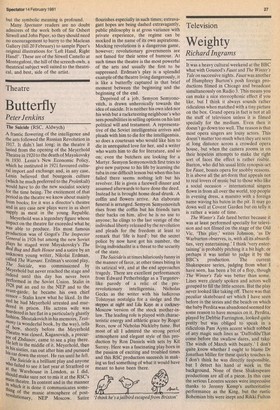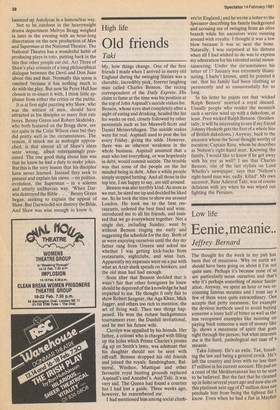Weighty
Richard In grams
It was a heavy cultural weekend at the BBC what with Gounod's Faust and The Winter's Tale on successive nights. Faust was another of Humphrey Burton's posh foreign productions filmed in Chicago and broadcast simultaneously on Radio 3. This means you can make a nice stereophonic effect if you like, but I think it always sounds rather ridiculous when matched with a tiny picture on the box. Grand opera in fact is not at all the stuff of television unless it is filmed specially for the medium. Even then it doesn't go down too well. The reason is that most opera singers are lousy actors. This doesn't matter too much when they are seen at long distance across a crowded opera house, but when the camera zooms in on their hopeless attempts to make the right sort of faces the effect is rather risible. Burton, who did his usual little synopsis-act for Faust, boasts opera for snobby reasons. It is above all the art-form that appeals not to real lovers of music but to those who like a social occasion — international singers flown in from all over the world, top people in evening dress, a maestro with a foreign name waving his baton in the pit. It may go down well at Covent Garden but on telly it is rather a waste of time.
The Winter's Tale fared better because it was at least performed specially for television and not filmed on the stage of the Old Vic. 'This play,' writes Johnson, as Dr Warburton observes, is, with all its absurdities, very entertaining.' I think 'very entertaining' is probably pitching it a bit high; or perhaps it was unfair to judge it by the BBC's production. The current Shakespeare series, judging from what I haVe seen, has been a bit of a flop, though The Winter's Tale was better than some. Lines were .clearly spoken and actors well grouped to fill the little screen. But the play never looked like taking off. There was that peculiar skateboard set which I have seen before in the series and the beach on which the baby Perdita was abandoned seemed for some reason to have mosaics on it. Perdita, played by Debbie Farrington, looked quite pretty but was obliged to speak in a ridiculous Pam Ayres accent which robbed of any magic such lines as 'Daffodils/That come before the swallow dares, and take/ The winds of March with beauty.' I don't quite know whether I ought to blame Dr Jonathan Miller for these quirky touches as I don't think he was directly responsible, but I detect his hand at work in the background. None of these Shakespeare productions are all of a piece. In this case the serious Leontes scenes were impressive thanks to Jeremy Kemp's authoritative performance as the King, but the rustic Bohemian bits were inept and Rikki Fulton hammed up Autolycus in a humourless way.
Not to be outdone in the heavyweight drama department Melvyn Bragg weighed in later in the evening with an hour-long dissertation on the new production of Man and Superman at the National Theatre. The National Theatre has a wonderful habit of producing plays in toto, putting back in the bits that other people cut out. Act Three of Shaw's play consists of a long philosophical dialogue between the Devil and Don Juan about this and that. Normally this scene is omitted because, it has nothing much, to do with the play. But now Sir Peter Hall has' chosen to re-insert it with, I think little applause from either the critics or the public.
It is at first sight puzzling why Shaw, who was the wittiest of men, should have attracted as his disciples so many first rate bores. Benny Green and Robert Skidelsky, who both featured on the Bragg show, are not quite in the Colin Wilson class but they did pretty well in the circumstances. The reason, it struck me as midnight approached, is that almost all of Shaw's ideas were wrong, albeit entertainingly presented. The one good thing about him was that he knew he had a duty to make jokes. But this is the very lesson that his disciples' have never. learned. Instead they seek to present and explain his views — on politics, evolution, the Superman — in a 'solemn and utterly unShavian way. 'When Darwin destroyed the Bible . . 'Benny Green began, seeking to explain the appeal of Shaw. But Darwin did not destroy the Bible. And Shaw was wise enough to know it.







































 Previous page
Previous page